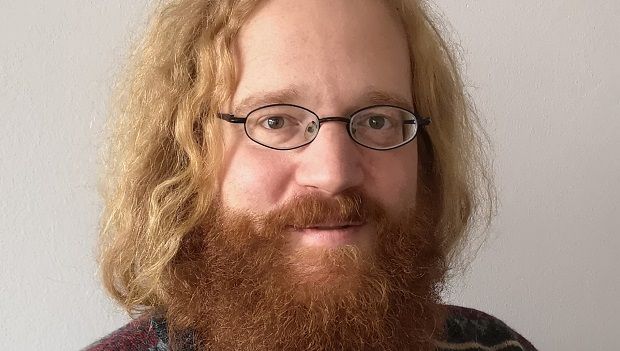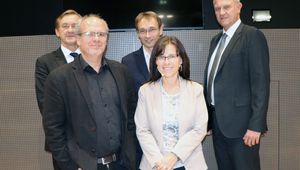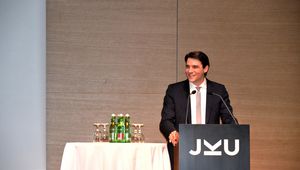Prof. Dr. Andreas Schell conducts research into quantum optics at the JKU’s Institute of Semiconductor and Solid-State Physics.

Together with Univ. Prof. Gerd Bramerdorfer, Prof. Dr. Andreas Schell will hold his inaugural lecture on January 29. We spoke with Prof. Schell about his research.
What is your area of research?
Univ. Prof. Andreas Schell: I conduct research in the field of quantum optics, particularly to better understand solid-state quantum emitters and apply what I’ve learned toward unlocking new quantum technology applications. To this end, it is important, for example, to embed the emitters in optical circuits.
In addition to my main focus, I also investigate other topics, including atomic vapor spectroscopy, levitated nanoparticles, and the interaction between light particles and gravity.
Why did you decided to come to the JKU and what exactly is your inaugural lecture about?
Univ. Prof. Andreas Schell: Given the broad scope of my research, I need a wide range of partners. The JKU can provide the ideal environment to advance my research. The TNF faculty provides expertise in very different areas and I have only just started to familiarize myself with everyone involved. We’ve already drafted concrete ideas to produce nanostructured optics and, with industry-related partners, new sensor concepts.
The JKU is also an outstanding location in terms of equipment. The new clean room at the LIT Open Innovation Center allows me to produce the quantum optical chips I need for my research on-site and using modern machines.
My inaugural lecture will focus mainly on solid-state quantum emitters. I aim to shed light on their properties and how they can be used to generate quantum states using an integrated technology. I will also talk about some of the innovative integration methods that we have developed.
What do you find fascinating about this area?
Univ. Prof. Andreas Schell: Physics is a very multifaceted discipline and I am fascinated by many areas of physics. Advancements in quantum optics and quantum technology are developing very rapidly, ranging from facilitating experiments on specific applications to conducting experiments on understanding the physical laws of the world. The variety is something that never ceases to inspire me. I also really enjoy working on experiments in the optical laboratory.
Why is this research even necessary, meaning how will it improve our lives?
Univ. Prof. Andreas Schell: We conduct research in an effort to acquire a new, better understanding and new insight. Each person has a different take on whether or not new findings can improve our lives.
Our research into quantum physics has the potential to yield new and more efficient approaches in tackling current technical problems. At the moment, I am particularly interested as to how these types of quantum mechanical effects may be used to improve sensors. For example, we can optimize properties relating to accuracy, power consumption, and even size. We are currently developing a measurement concept based on atomic vapors capable of measuring the shortest speeds with maximum precision.
Another one of my goals is to also be able to apply innovative measurement principles to explore effects that cannot be otherwise measured by conventional sensors. This will not only improve our understanding of applications, but will also deepen what we know about the fundamental principles of physics.
Why should students take your classes?
Univ. Prof. Andreas Schell: Students at the JKU can choose between many different passionate and motivated faculty members. I believe it is important for students to also have an opportunity to discover and experience different educational approaches.
I believe that when teaching, one should encourage the student’s creativity and the ability to think independently so that students not only reproduce content, they can critically engage with it. I believe it is extremely important for future researchers to have the ability to move away from the course instructor’s lecture-based perspective and independently engage in academic discourse. I try to supervise the students closely and I always listen to their concerns.
What are you currently working on?
Univ. Prof. Andreas Schell: At the moment, my main project involves building new quantum optics laboratories at the JKU. Once completed, we will bring this building to life by setting up microscopy and spectroscopy as well as characterizing quantum states.
I am also continuing work on spectroscopy and quantum emitters at my former research facility in Hanover and moving to the JKU will be another challenge.
In addition to specific research projects, I am also working on settling in Austria. In the past, I worked in many places in different countries including Japan, Spain, and the Czech Republic, but now I want to make new connections here in Austria. Given the extensive research landscape here, I anticipate being involved in this project for a considerable amount of time.
What are your hobbies?
Univ. Prof. Andreas Schell: I personally enjoy conducting research and carrying out experiments, and not only in the field of physics. As this could be considered too closely related to my professional responsibilities I would rather not refer to it as a hobby.
That said, I enjoy many activities in my free time, such as playing chess and reading, but it also depends on where I am. In Spain, I went swimming a lot, and in Hanover, I cycled often along the flat countryside. Now in Linz, I intend to hike more and enjoy the outdoors. I'm also looking forward to the wide range of cultural activities Linz has to offer, and exploring the surrounding area.
What else do you want to do or accomplish in your life?
Univ. Prof. Andreas Schell: I like to think outside-of-the-box and would love to pursue other subjects outside of physics. Studying is, however, very time-consuming, meaning I won’t be able to do that in the foreseeable future. Nevertheless, I hope to become more involved with interdisciplinary project teams and broaden my expertise in this way. I am currently in discussions with scholars and researchers in other fields, such as engineering and humanities, about developing innovative ideas based on a transdisciplinary perspective. Together with sociologists, we are taking a look at some of the reasons why people opt to take a gap year after graduating from school, and how this impacts their subsequent choices in academia or professionally.












